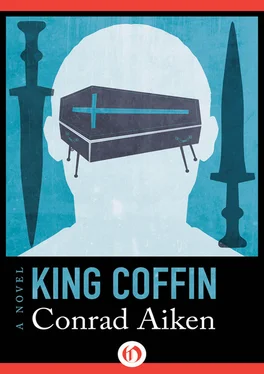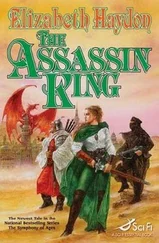Something had happened: some message had come.
He jumped up, walked quickly up the steep aisle, heard behind him the phrase “show you a broken-down dance,” dived down through the marble and plush tunnel which led to the foyer, emerged into the alley, and saw, a block away, the illuminated front of the Park Street Church, and halfway to this, his hat in one hand, his coat in the other, Jones, in the act of running.
Before Jones had reached the corner, he had himself begun running, laughing a little breathlessly as he did so: the speed was a delight, the action was a relief, in the whole unexpected event there was something comically satisfactory. That they should be running thus along a half-lighted alley, separated by fifty yards, the one ahead grotesquely unaware of the one behind — as if, in fact, they were somehow connected , were two parts of a single mechanism — this was both ridiculous and right; and that the whole great adventure should thus suddenly accelerate and take momentary shape in a species of action so elementary and humble was essentially good . He had time to think this as he sprinted towards the florist’s at the corner, where Jones had already turned to the left, and he had time also to foresee for Jones a choice amongst three possible actions: he could go out to Reservoir Street by subway and streetcar — which seemed in the circumstances unlikely—; he could go by subway to Harvard Square, and there take a taxi; or, if a real panic had possessed him, he could go by taxi all the way from Boston, sacrificing actual speed for the illusion of speed which is always to be extracted from a feeling of uninterrupted activity. All this, of course, was based on the assumption that it was to Reservoir Street that he was going — was it just possible he was going somewhere else?
Arrived at the corner, he stopped, stood still, glanced quickly south towards the subway entrance, saw no sign of Jones, but then at once noticed that a taxi in the Park Street stand was just at that moment snarling into motion, swerving left as it did so. It was turning north to go along Tremont Street, shot past him accelerating rapidly, and in the back seat Jones was fleetingly visible — leaning forward to struggle into his coat, his derby hat perched at a queer angle on the back of his head, obviously stuck there in a hurry, the earnest little face wearing an expression which was quite clearly something new, something different.
If it wasn’t fright, it was something very like it: Jones was frightened. For once, he had lost his smugness and complacency, his perpetual air of competence.
Something had gone wrong.
He watched the taxi out of sight, glanced at his wrist watch, glanced at his wrist watch, glanced up also at the clock of Park Street Church, found that he had forgotten the time as soon as he had noticed what it was, stood irresolute. Jones was still there, he had not in any sense escaped, his swift departure was merely a blind movement from one part of the closed circle to another, he was as easily reached there as anywhere else, and as easily seen. Standing here motionless by the florist’s shop, it was nevertheless as if he were watching Jones from above: looked down through the taxi roof, saw Jones nervously take out a cigarette, strike several matches in an attempt to light it with shaking hands. But if this was true, and if Jones could not really escape, it was also true that this new development had subtly altered the situation, the equation had been multiplied by an unknown quantity, the simple was becoming complex. To make the necessary arrangements now, in the face of this, would perhaps not be quite so easy: the greater pressure would have to be met with greater guile, or even with greater violence. The trap would have to be a more powerful one, and more enticingly baited.
But suppose it turned out to be something really serious.
He frowned, crossed the street, opened the taxi door with automatic hand, and said:
— Cambridge. Over the Cambridge bridge. If you go fast enough, you’ll overtake the Independent Taxi that just left here. Keep a little way behind it and follow it: I’ll tell you when to stop.
— Yes, sir!
Yes, the action had become unexpectedly complicated, the action or his awareness of it, the thing was on several different planes all at once, and in the very act of deciding to take a taxi he had still been on the point — surprisingly — of going across the Common to see Gerta, or even, if she had happened to be out, of then proceeding to Sandbach’s. To see Gerta at this juncture was reasonable enough: for a moment it had seemed in fact perhaps desirable. To put in an appearance, and above all a cheerful one, to laugh loudly about the whole thing, discuss her queer picture with her, make plans for an expedition to New York in the following week, disarm her completely — the shape of this action had risen sharply before him, he had seen it vividly as he glanced across the Common toward the Frog Pond, had begun in advance to enjoy the simplicity of the deception. The words of the conversation were clear, the tone was precise, Gerta’s initial surprise gave way to relief, even to gayety. Come out and have a drink. And I’ll tell you the greatest joke yet. Come down to the Union Oyster House and have some little-necks. Or shall we go to that little bar at the end of Charles Street? I’ve made a very peculiar discovery, I’d like to tell you about it. The last dislocation!.. But if Gerta was out, if Sandbach were there, or if he went to Sandbach’s room — this wasn’t quite so clear. Why? Why Sandbach? The image was repellent, the reality of Sandbach in Sandbach’s room was twisted and a little nauseating, the sound and shape of the interview was drawling and feverish, unnatural. No, the impulse was obscure and unpleasant, there was really no need to see Sandbach again, Sandbach was out of it for good. Sandbach had been defeated, even if he didn’t yet know it — and didn’t he actually know it? The tall shadow of Jasper Ammen was behind Gerta, Sandbach was aware of this and was angry about it, he struggled helplessly with it, knew that it would be useless. But just the same to stand before Sandbach now, in his own room, to smile down on him and patronize him, look idly at his books, ask casually about Breault, make no reference whatever to Gerta—
He closed his eyes for a second as the taxi shot up the curve of the bridge, kept in mind for a moment the image of the lighted train which had rushed past them full of people, felt suddenly a little sick. As against all this, this jangle of Gerta and Sandbach and Toppan, the Jones situation was still comfortingly simple. It had the merit of a pure perfection, stood off by itself, was as clear and beautiful as a single flower. To hold this up for admiration was still the best possible of all realities, it kept its finality, and having admired it to destroy it—
But exactly why, in the midst of this action, had he wanted to deviate from it, to see Gerta? With the revolver in his pocket, and Jones so close at hand, with the scene already so developed and so rich in potentialities, so rewardingly immediate, why step aside from it? The night was still young, the possibilities were immense, anything at all might yet happen. To intercept Jones might not be convenient, but to call him up by telephone, make an appointment, even to meet him later in the evening — what could prevent this, except of course this new development, his mysterious flight to Cambridge?
He watched the swift dance of streetlights, counted them, one, two, three, four, was half-consciously aware presently that they had passed the Technology buildings, crossed Massachusetts Avenue, and that there was still no sign of the other taxi. Perhaps they had gone by Broadway; but it hardly mattered. It would be just as well to keep a discreet distance behind, there was no particular reason for remaining within sight: the odds against his going anywhere but Reservoir Street were tremendous. Moreover, to realize this was to realize also his motive for wishing, at this point, to deviate. It was based on a sense of complete confidence, the feeling that poor Jones was now completely in the bag. In effect, Jones was still as close to him as he had been in his box at the theater: just as near, just as unguarded, just as unsuspecting. The flight from the box, from the theater, the dash to the taxi-stand, and the ensuing swoop on Cambridge, all this was really nothing more than the circumscribed panic of the mouse: the dart from sofa-shadow to chair-shadow. The door was still closed, the mouse was still within the room.
Читать дальше












